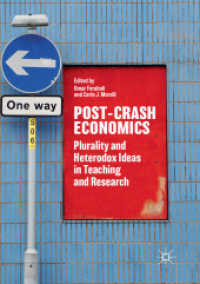Full Description
Communication in an Era of Global Conflicts assesses trends and issues in communication and their implications for conflicts in the African context. In doing so, the various chapters draw from culture, tradition, folklore, communication and conflict theories, principles and strategies, and from systems approach to conflict resolution. The underlying assumption of all the chapters is the pivotal role of communication—new media, traditional mass communication, interpersonal communication, intercultural communication, and communication technologies—in conflict and conflict resolution. This book is unique for its multidimensional perspectives, a long overdue addition to the growing literature on conflicts in Africa.
Contents
Part 1 PART I: THEORIES OF CONFLICT Chapter 2 1.Attribution, Psychodynamics and Communication Behaviors of Conflict Actors Chapter 3 2.Media Messages, Sins of Distortion and Signs of Wisdom Chapter 4 3.Agenda-Setting, African Media and Conflict Chapter 5 4.Framing Theory and Conflict Transformation in Rwanda and Bosnia Part 6 PART II: SYSTEMS PERSPECTIVES ON CONFLICT Chapter 7 5. Professional and Organizational Influences on Conflict Reporting Chapter 8 6.Media Messages, the Academy and the Internet Chapter 9 7.Global Media and Changing News Practices Chapter 10 8.Conflict, Globalization, and the New World Information and Communication Order Chapter 11 9.Threat Perceptions and Security in the West African Sub-region Chapter 12 10.Virtual Communication and the Role of Diasporic Communities in Conflict Mediation Part 13 PART III: CONFLICT STRATEGIES Chapter 14 11.Harnessing the Power of African Traditional and Modern Media Systems to Avert Conflicts in Africa Chapter 15 12.Conflict Resolution in African Folklore Chapter 16 13. The Press as Tools and Casualties of Political Conflicts in Nigeria Chapter 17 14.Mass Media and the Establishment of Peace as Path toSustainable Development in Africa Part 18 PART IV: AFRICA IN AN ERA OF GLOBAL CONFLICTS Chapter 19 15.Mass Media and Ethnic Conflict in West Africa Chapter 20 16.Social Conflict, Communication and Youth in Tanzania Chapter 21 17.Negotiating the Thorny Road of Conflict as Nigeria Opens its Communications Market to Private interests Chapter 22 18. Global Media and the Replication of international Conflicts in Northern Nigeria Chapter 23 19.Conflict and Ferment in International Communication Chapter 24 20.Multinational Corporations, Community Relations and the Niger Delta Conflict Chapter 25 21. Poverty, Professionalism and the Challenges of Democratization among Conflicted Print Media Journalists in Nigeria Chapter 26 22. Language of Conflict and the Coverage of Global Terrorism in Kenyan Mass Media 1998-2005 Chapter 27 23.Managing Conflict in Nigeria through Television








